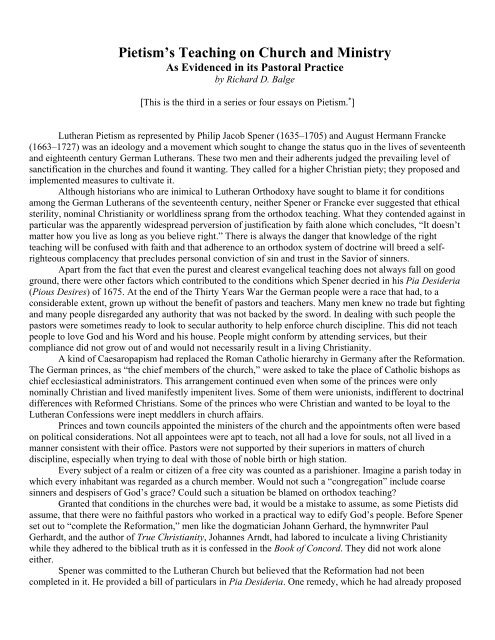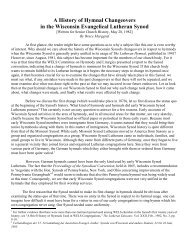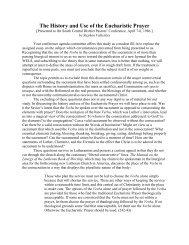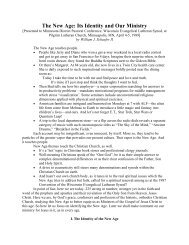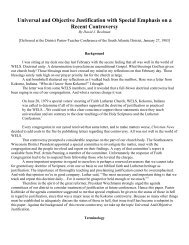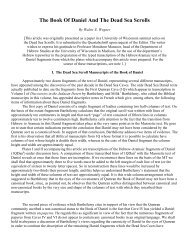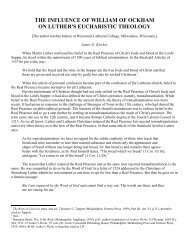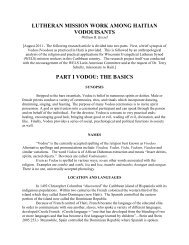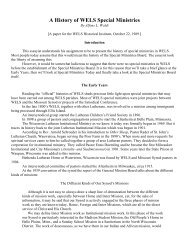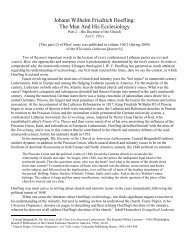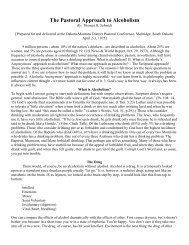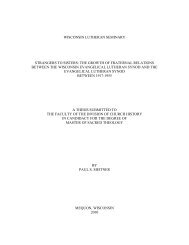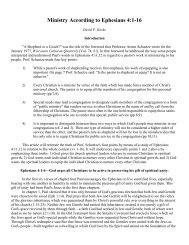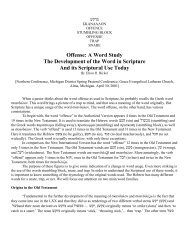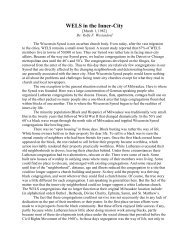Pietism's Teaching on Church and Ministry - Wisconsin Lutheran ...
Pietism's Teaching on Church and Ministry - Wisconsin Lutheran ...
Pietism's Teaching on Church and Ministry - Wisconsin Lutheran ...
Create successful ePaper yourself
Turn your PDF publications into a flip-book with our unique Google optimized e-Paper software.
Pietism’s <str<strong>on</strong>g>Teaching</str<strong>on</strong>g> <strong>on</strong> <strong>Church</strong> <strong>and</strong> <strong>Ministry</strong><br />
As Evidenced in its Pastoral Practice<br />
by Richard D. Balge<br />
[This is the third in a series or four essays <strong>on</strong> Pietism. � ]<br />
<strong>Lutheran</strong> Pietism as represented by Philip Jacob Spener (1635–1705) <strong>and</strong> August Hermann Francke<br />
(1663–1727) was an ideology <strong>and</strong> a movement which sought to change the status quo in the lives of seventeenth<br />
<strong>and</strong> eighteenth century German <strong>Lutheran</strong>s. These two men <strong>and</strong> their adherents judged the prevailing level of<br />
sanctificati<strong>on</strong> in the churches <strong>and</strong> found it wanting. They called for a higher Christian piety; they proposed <strong>and</strong><br />
implemented measures to cultivate it.<br />
Although historians who are inimical to <strong>Lutheran</strong> Orthodoxy have sought to blame it for c<strong>on</strong>diti<strong>on</strong>s<br />
am<strong>on</strong>g the German <strong>Lutheran</strong>s of the seventeenth century, neither Spener or Francke ever suggested that ethical<br />
sterility, nominal Christianity or worldliness sprang from the orthodox teaching. What they c<strong>on</strong>tended against in<br />
particular was the apparently widespread perversi<strong>on</strong> of justificati<strong>on</strong> by faith al<strong>on</strong>e which c<strong>on</strong>cludes, “It doesn’t<br />
matter how you live as l<strong>on</strong>g as you believe right.” There is always the danger that knowledge of the right<br />
teaching will be c<strong>on</strong>fused with faith <strong>and</strong> that adherence to an orthodox system of doctrine will breed a selfrighteous<br />
complacency that precludes pers<strong>on</strong>al c<strong>on</strong>victi<strong>on</strong> of sin <strong>and</strong> trust in the Savior of sinners.<br />
Apart from the fact that even the purest <strong>and</strong> clearest evangelical teaching does not always fall <strong>on</strong> good<br />
ground, there were other factors which c<strong>on</strong>tributed to the c<strong>on</strong>diti<strong>on</strong>s which Spener decried in his Pia Desideria<br />
(Pious Desires) of 1675. At the end of the Thirty Years War the German people were a race that had, to a<br />
c<strong>on</strong>siderable extent, grown up without the benefit of pastors <strong>and</strong> teachers. Many men knew no trade but fighting<br />
<strong>and</strong> many people disregarded any authority that was not backed by the sword. In dealing with such people the<br />
pastors were sometimes ready to look to secular authority to help enforce church discipline. This did not teach<br />
people to love God <strong>and</strong> his Word <strong>and</strong> his house. People might c<strong>on</strong>form by attending services, but their<br />
compliance did not grow out of <strong>and</strong> would not necessarily result in a living Christianity.<br />
A kind of Caesaropapism had replaced the Roman Catholic hierarchy in Germany after the Reformati<strong>on</strong>.<br />
The German princes, as “the chief members of the church,” were asked to take the place of Catholic bishops as<br />
chief ecclesiastical administrators. This arrangement c<strong>on</strong>tinued even when some of the princes were <strong>on</strong>ly<br />
nominally Christian <strong>and</strong> lived manifestly impenitent lives. Some of them were uni<strong>on</strong>ists, indifferent to doctrinal<br />
differences with Reformed Christians. Some of the princes who were Christian <strong>and</strong> wanted to be loyal to the<br />
<strong>Lutheran</strong> C<strong>on</strong>fessi<strong>on</strong>s were inept meddlers in church affairs.<br />
Princes <strong>and</strong> town councils appointed the ministers of the church <strong>and</strong> the appointments often were based<br />
<strong>on</strong> political c<strong>on</strong>siderati<strong>on</strong>s. Not all appointees were apt to teach, not all had a love for souls, not all lived in a<br />
manner c<strong>on</strong>sistent with their office. Pastors were not supported by their superiors in matters of church<br />
discipline, especially when trying to deal with those of noble birth or high stati<strong>on</strong>.<br />
Every subject of a realm or citizen of a free city was counted as a parishi<strong>on</strong>er. Imagine a parish today in<br />
which every inhabitant was regarded as a church member. Would not such a “c<strong>on</strong>gregati<strong>on</strong>” include coarse<br />
sinners <strong>and</strong> despisers of God’s grace? Could such a situati<strong>on</strong> be blamed <strong>on</strong> orthodox teaching?<br />
Granted that c<strong>on</strong>diti<strong>on</strong>s in the churches were bad, it would be a mistake to assume, as some Pietists did<br />
assume, that there were no faithful pastors who worked in a practical way to edify God’s people. Before Spener<br />
set out to “complete the Reformati<strong>on</strong>,” men like the dogmatician Johann Gerhard, the hymnwriter Paul<br />
Gerhardt, <strong>and</strong> the author of True Christianity, Johannes Arndt, had labored to inculcate a living Christianity<br />
while they adhered to the biblical truth as it is c<strong>on</strong>fessed in the Book of C<strong>on</strong>cord. They did not work al<strong>on</strong>e<br />
either.<br />
Spener was committed to the <strong>Lutheran</strong> <strong>Church</strong> but believed that the Reformati<strong>on</strong> had not been<br />
completed in it. He provided a bill of particulars in Pia Desideria. One remedy, which he had already proposed
in a serm<strong>on</strong> of 1669, was to organize collegia pietatis, “gatherings in the interest of piety.” It is from these<br />
gatherings that the term Pietist derived, although its c<strong>on</strong>notati<strong>on</strong>s came to include much more than the meeting<br />
of c<strong>on</strong>venticles. As is often the case, a term used pejoratively was eventually accepted as an h<strong>on</strong>orable label by<br />
those who were so designated.<br />
What Spener proposed in 1669 sounds somewhat like a private Bible class:<br />
How much good it would do if good friends would come together <strong>on</strong> a Sunday <strong>and</strong> instead of<br />
getting out glasses, cards, or dice would take up a book <strong>and</strong> read from it for the edificati<strong>on</strong> of all<br />
or would review something from serm<strong>on</strong>s that were heard! If they would speak with <strong>on</strong>e another<br />
about the divine mysteries, <strong>and</strong> the <strong>on</strong>e who received most from God would try to instruct his<br />
weaker brethren! If, should they be not quite able to find their way through, they would ask a<br />
preacher to clarify the matter! If this should happen, how much evil would be held in abeyance,<br />
<strong>and</strong> how the blessed Sunday would be sanctified for the great edificati<strong>on</strong> <strong>and</strong> marked benefit of<br />
all! It is certain, in any case, that we preachers cannot instruct the people from our pulpits as<br />
much as is needful unless other pers<strong>on</strong>s in the c<strong>on</strong>gregati<strong>on</strong>, who by God’s grace have a superior<br />
knowledge of Christianity, take the pains, by virtue of their universal Christian priesthood, to<br />
work with <strong>and</strong> under us to correct <strong>and</strong> reform as much in their neighbors as they are able<br />
according to the measure of their gifts <strong>and</strong> their simplicity. i<br />
The potential for both blessing <strong>and</strong> mischief lay in these collegia pietatis. Mutual edificati<strong>on</strong>, instructi<strong>on</strong><br />
of weaker brethren, discussi<strong>on</strong> of difficult passages with the pastor, relieving the pastor of some of his work <strong>and</strong><br />
the exercise of the universal priesthood. These were <strong>and</strong> are worthy aims to pursue. But the depreciati<strong>on</strong> of<br />
other forms of social relaxati<strong>on</strong> <strong>and</strong> the suggesti<strong>on</strong> that lay members purpose to correct <strong>and</strong> reform their<br />
neighbors suggest that some of the less evangelical aspects of Pietism were present from the beginning.<br />
At Frankfurt-am-Main Spener implemented his plan with Sunday <strong>and</strong> Wednesday gatherings in his own<br />
residence. The Sunday serm<strong>on</strong> was discussed al<strong>on</strong>g with biblical texts <strong>and</strong> devoti<strong>on</strong>al literature. A further goal<br />
of the meetings was the establishment <strong>and</strong> cultivati<strong>on</strong> of friendships am<strong>on</strong>g those with a “Christian dispositi<strong>on</strong>”<br />
who would encourage Christian piety in <strong>on</strong>e another. Spener hoped that if a smaller group experienced a<br />
religious renewal they would serve as a leaven to improve the lump <strong>and</strong> create a “living Christianity.”<br />
Quite deliberately he followed the stratagem of fostering “little churches within the church,” ecclesiolae<br />
in ecclesia. This naturally raised the issues of proper church order <strong>and</strong> the integrity of the ministry. The aims<br />
<strong>and</strong> methods also made theologians w<strong>on</strong>der about Spener’s underst<strong>and</strong>ing of church <strong>and</strong> ministry. Although he<br />
<strong>and</strong> those who imbibed his spirit <strong>and</strong> used his methods did not develop new dogmas of church <strong>and</strong> ministry, in<br />
part because they were in reacti<strong>on</strong> against dogmatics, their views did work themselves out in their practical<br />
ministry. Their real teaching must be surmised from their practice <strong>and</strong> we may venture some generalizati<strong>on</strong>s <strong>on</strong><br />
the basis of what they said <strong>and</strong> did.<br />
Spener wanted to uphold the <strong>Lutheran</strong> view of what the church is. He had no desire to undercut the<br />
effectiveness of the public ministry. Formally, he <strong>and</strong> Francke both adhered to the teaching of Augustana VII <strong>on</strong><br />
the church <strong>and</strong> Augustana VIII <strong>on</strong> the ministry. Neither wanted to equate the true invisible church with a visible<br />
community.<br />
But in making doctrine sec<strong>on</strong>dary <strong>and</strong> assigning priority to Christian living their “marks of the <strong>Church</strong>”<br />
tended to shift from “the doctrine of the Gospel <strong>and</strong> the administrati<strong>on</strong> of the Sacraments” (A. C. VII) to<br />
“chastity, patience, the fear of God, love to <strong>on</strong>e’s neighbor <strong>and</strong> the works of love” (Apology VII <strong>and</strong> VIII).<br />
Practically, there was a shift from thinking of the church as the communi<strong>on</strong> of those who are righteous by faith<br />
to those who are ethically righteous, who have a “living Christianity.”<br />
It was not Spener’s intenti<strong>on</strong> to separate “true” Christians from others. The c<strong>on</strong>venticle was to be<br />
ecclesiola in ecclesia, not ecclesiola extra ecclesiam. The collegia pietatis were not to replace regular church<br />
attendance <strong>and</strong> there was to be no celebrati<strong>on</strong> of the Lord’s Supper in small groups apart from the public<br />
services.<br />
2
Separati<strong>on</strong>s did, however, occur. In some Pietists the impulse to separate from the church was str<strong>on</strong>ger<br />
than the impulse to serve it. As early as 1676 <strong>on</strong>e of Spener’s friends <strong>and</strong> supporters began to absent himself<br />
from the Lord’s Supper, a course of acti<strong>on</strong> that seemed logical <strong>and</strong> necessary to him <strong>and</strong> to others if the<br />
instituti<strong>on</strong>al church was really as bad as Spener said it was. In 1685 the latter published Der Klagen ueber das<br />
verdorbene Christenthum Missbrauch und rechter Gebrauch (Misuse <strong>and</strong> Correct Use of Complaints about the<br />
Sad State of Christianity) to argue that separati<strong>on</strong> from the instituti<strong>on</strong>al church, even with its faults <strong>and</strong><br />
imperfecti<strong>on</strong>s, was not justified. When further tendencies toward elitism <strong>and</strong> separatism appeared, Spener grew<br />
cautious <strong>and</strong> did not introduce the collegium at his later charges in Dresden <strong>and</strong> Berlin.<br />
A generati<strong>on</strong> later Francke operated with the c<strong>on</strong>cept of a three-way divisi<strong>on</strong> of the c<strong>on</strong>gregati<strong>on</strong>. The<br />
largest group, to his way of thinking, was c<strong>on</strong>stituted of those who had the form of godliness but lacked its<br />
substance. It is difficult to avoid the impressi<strong>on</strong> that he was denying the faith of those who did not meet his<br />
st<strong>and</strong>ards of how the Christian lives. Valentin Ernst Loescher (1673–1749), the most irenic of Pietism’s<br />
c<strong>on</strong>temporary critics, seemed to gain that impressi<strong>on</strong>, too. One of the points of c<strong>on</strong>tenti<strong>on</strong> between him <strong>and</strong><br />
Francke’s Halle faculty was whether ethical holiness is a mark of the church’s authenticity.<br />
The sec<strong>on</strong>d group in Francke’s three-way divisi<strong>on</strong> c<strong>on</strong>sisted of those who had made a beginning but<br />
were not yet fully committed. In modern parlance they had not yet made a “decisi<strong>on</strong> for Christ,” a phrase which<br />
Francke would not have found offensive.<br />
The smallest group, fully committed according to Francke’s norms, c<strong>on</strong>stituted the “true” church. He<br />
strove to enlarge <strong>and</strong> extend this inner circle. Whether he realized it or not, he was trying to make the invisible<br />
<strong>Church</strong> visible. It may not be an overstatement to say that he believed he could identify “the true people of God,<br />
regenerated by the Holy Ghost” (Apology VII <strong>and</strong> VIII, Trigl. 231).<br />
Another of Loescher’s charges against the Pietism of Halle was that it undervalued the means of grace.<br />
That was not formally true of Spener. In Pia Desideria he wrote: “If there is to be any good in us, it must be<br />
brought about by God. To this end the Word of God is the powerful means, since faith must be enkindled<br />
through the gospel.” ii Both he <strong>and</strong> Francke sought to retain the teaching that Holy Baptism is objectively<br />
efficacious. Both expressed the c<strong>on</strong>victi<strong>on</strong> that fellowship with God is effected by means of the Word.<br />
But it is a fact that <strong>on</strong>e of the peculiarities of Francke’s pastoral work was that he urged people to pray<br />
for the kind of c<strong>on</strong>versi<strong>on</strong> experience he had underg<strong>on</strong>e. In this he was not directing them to the objective truth<br />
of Christ’s vicarious sacrifice <strong>and</strong> to his righteousness for us. His s<strong>on</strong>-in-law Fresenius, who helped to c<strong>on</strong>tinue<br />
the educati<strong>on</strong>al <strong>and</strong> charitable work at Halle after Francke’s death, was not far removed from his mentor when<br />
he gave instructi<strong>on</strong> for a “thorough” c<strong>on</strong>versi<strong>on</strong> “in a short time.” In his Book <strong>on</strong> C<strong>on</strong>fessi<strong>on</strong> <strong>and</strong> Communi<strong>on</strong><br />
he wrote: “Pray for grace …! This prayer you should offer, not <strong>on</strong>ce or twice, but you must c<strong>on</strong>tinue offering it<br />
daily with sighs <strong>and</strong> str<strong>on</strong>g crying until you obtain grace, which assures you from your own experience that<br />
your heart has been truly changed.” iii Thus the troubled soul or urgent seeker was directed to prayer <strong>and</strong><br />
pers<strong>on</strong>al experience rather than to the timeless <strong>and</strong> universal truth of justificati<strong>on</strong> in Christ.<br />
The neglect of objective preaching of universal rec<strong>on</strong>ciliati<strong>on</strong> <strong>and</strong> justificati<strong>on</strong> was bound to lead to that<br />
legalism which characterized Halle under Francke’s successors. The anthropocentrism which directed men to<br />
self, feeling <strong>and</strong> experience instead of to the Word, could easily become the anthropocentrism which enthr<strong>on</strong>ed<br />
reas<strong>on</strong> in theology. It did. Historians are agreed that Pietism paved the way for Rati<strong>on</strong>alism at Halle, especially<br />
at Halle.<br />
Pietism stressed that churchly authority really bel<strong>on</strong>gs to the gathering of Christians. Spener <strong>and</strong><br />
Francke both believed that c<strong>on</strong>gregati<strong>on</strong>s should have a voice in calling their pastors <strong>and</strong> that there should be<br />
lay representati<strong>on</strong> at synods. Princes <strong>and</strong> c<strong>on</strong>sistories were <strong>on</strong>ly exercising a delegated authority, the Pietists<br />
believed, <strong>and</strong> when they misused it the authority should revert to the c<strong>on</strong>gregati<strong>on</strong>s.<br />
As we have noted, some of the princes were uni<strong>on</strong>ists, indifferent to the c<strong>on</strong>fessi<strong>on</strong>al distincti<strong>on</strong>s<br />
between the <strong>Lutheran</strong> <strong>and</strong> Reformed churches. Much theological effort <strong>on</strong> the part of <strong>Lutheran</strong>s was directed<br />
toward making those differences plain <strong>and</strong> to validate the <strong>Lutheran</strong> positi<strong>on</strong>. Spener <strong>and</strong> Francke were not<br />
entirely unappreciative of that positi<strong>on</strong> <strong>and</strong> those efforts. They both, however, had read <strong>and</strong> learned from<br />
Johannes Arndt’s True Christianity <strong>and</strong> they shared the latter’s “moderate” approach to c<strong>on</strong>fessi<strong>on</strong>al questi<strong>on</strong>s.<br />
3
Late in life Arndt recounted why he had written his great devoti<strong>on</strong>al classic <strong>and</strong> included am<strong>on</strong>g the reas<strong>on</strong>s that<br />
he had “wished to withdraw the minds of students <strong>and</strong> preachers from an inordinately c<strong>on</strong>troversial <strong>and</strong><br />
polemical theology which has well-nigh assumed the form of an earlier scholastic theology.” iv<br />
In Pia Desideria Spener advocated a practice of heartfelt love toward all unbelievers <strong>and</strong><br />
heretics. While we should indicate to them that we take no pleasure in their unbelief or false<br />
belief or the practice <strong>and</strong> propagati<strong>on</strong> of these, but rather are vigorously opposed to them, yet in<br />
other things which pertain to human life we should dem<strong>on</strong>strate that we c<strong>on</strong>sider these people to<br />
be our neighbors …, regard them as our brothers according to the right of comm<strong>on</strong> creati<strong>on</strong> <strong>and</strong><br />
the divine love that is extended to all (though not according to regenerati<strong>on</strong>), <strong>and</strong> therefore are so<br />
disposed in our hearts toward them as the comm<strong>and</strong> to love all others as we love ourselves<br />
dem<strong>and</strong>s.… v<br />
This was not liberalism or uni<strong>on</strong>ism but wholesome counsel for c<strong>on</strong>fessi<strong>on</strong>al <strong>Lutheran</strong>s in any age.<br />
Halle nurtured the noti<strong>on</strong> that the doctrines which really matter are the basic truths, that is biblical truths<br />
which have been verified in the experience of the Christian community. There was that appeal to experience<br />
again <strong>and</strong> that setting of human criteria. It made for a looser view of c<strong>on</strong>fessi<strong>on</strong>al <strong>Lutheran</strong>ism than either Arndt<br />
or Spener had advocated <strong>and</strong> a more liberal attitude toward other “evangelicals.” It also helped to prepare the<br />
climate for Rati<strong>on</strong>alism’s easy triumph at Halle when Christian Wolff, deposed in 1723, returned in triumph in<br />
1740.<br />
Francke did not advocate uni<strong>on</strong> with the Reformed. He did, however, urge unified efforts in missi<strong>on</strong>s,<br />
educati<strong>on</strong> <strong>and</strong> charitable work. When nineteenth century Pietists turned from rati<strong>on</strong>alism to a more c<strong>on</strong>fessi<strong>on</strong>al<br />
<strong>and</strong> ecclesiastical mindset, many <strong>Lutheran</strong>s c<strong>on</strong>tinued their participati<strong>on</strong> in various uni<strong>on</strong>istic enterprises <strong>and</strong><br />
instituti<strong>on</strong>s.<br />
The literary opp<strong>on</strong>ent of Pietism, a younger c<strong>on</strong>temporary of Francke, was the aforementi<strong>on</strong>ed Valentin<br />
Ernst Loescher. In his Unschuldige Nachrichten v<strong>on</strong> alten und neuen theologischen Sachen (Guileless Reports<br />
<strong>on</strong> Theological Matters Both Old <strong>and</strong> New) <strong>and</strong> in a colloquy with the Halle faculty, he charged that Pietism<br />
was depriving the ministry of its authority. The charge had been leveled by others earlier against Spener.<br />
Spener’s sec<strong>on</strong>d proposal for renewal in Pia Desideria had been “the establishment <strong>and</strong> diligent exercise<br />
of the spiritual priesthood.” He hoped, through the collegia pietatis <strong>and</strong> through his writing, to encourage <strong>and</strong><br />
equip Christians for the discharge of this priesthood. vi It is a fact that his views <strong>on</strong> the spiritual priesthood of all<br />
believers were subject to misinterpretati<strong>on</strong> <strong>and</strong> misuse. He himself recognized this <strong>and</strong> warned against it,<br />
proposing safeguards to prevent it.<br />
He elaborated his teaching with seventy questi<strong>on</strong>s <strong>and</strong> answers in The Spiritual Priesthood in 1677. vii<br />
Here he taught that Christ has purchased this priesthood, that it is bestowed by the Holy Spirit <strong>and</strong> that it is<br />
acquired in Holy Baptism. It is active in three ways. The first is in spiritual sacrifice, the office of yielding all to<br />
the Redeemer. The sec<strong>on</strong>d is in praying <strong>and</strong> blessing, the office of intercessi<strong>on</strong>. The third is in exhorting <strong>and</strong><br />
c<strong>on</strong>soling <strong>on</strong>e’s fellow Christians, the office of the divine Word.<br />
It was especially in c<strong>on</strong>necti<strong>on</strong> with the third office that Spener had to warn against abuses. In Questi<strong>on</strong><br />
26 he asks, “Are then all Christians preachers <strong>and</strong> are they to exercise the preaching office?” He answers: “No.<br />
To exercise the office publicly in the c<strong>on</strong>gregati<strong>on</strong> before all <strong>and</strong> over all requires a special call.” He might<br />
have added “<strong>on</strong> behalf of all” to further clarify what public ministry is. In Questi<strong>on</strong>s 46 to 51 he speaks of the<br />
resp<strong>on</strong>sibility of all Christians to care for the salvati<strong>on</strong> <strong>and</strong> edificati<strong>on</strong> of others <strong>and</strong> warns that this is to be d<strong>on</strong>e<br />
“without hindrance to the public office of the regular ministry.” In answer to the questi<strong>on</strong> (68) what the called<br />
pastors should do to prevent disorder, he c<strong>on</strong>cludes that “they should keep the supervisi<strong>on</strong> <strong>and</strong> Christian<br />
directi<strong>on</strong> of the work in their h<strong>and</strong>s.” Questi<strong>on</strong> 69 asks how spiritual priests should c<strong>on</strong>duct themselves so as to<br />
prevent disorder. The answer is, “They should associate faithfully with godly ministers.…They should willingly<br />
give them an account of their doings <strong>and</strong> follow their Christian counsel, <strong>and</strong> especially refrain from all<br />
disparagement of them, picking flaws in them <strong>and</strong> injuring their office with any<strong>on</strong>e.”<br />
4
Spener did not want to be a D<strong>on</strong>atist, but he had described in Pia Desideria how a “godly minister”<br />
lives. He wrote of clergy who “do not actually possess the true marks of a new birth.” viii He placed a higher<br />
value <strong>on</strong> godly living than <strong>on</strong> orthodox teaching. It is a fact that some of his followers <strong>and</strong> many later Pietists<br />
separated themselves from the church when they determined that their ministers were not “godly,” that their<br />
pers<strong>on</strong>al character flaws were not compensated for by their orthodoxy.<br />
One of Spener’s complaints regarding the training of pastors was that it was possible to complete<br />
university training without having had a single course in exegesis. Another was that many graduates of the<br />
theological faculties had no idea how to preach in the language of the people. He proposed that collegia pietatis<br />
be initiated both to remedy these shortcomings <strong>and</strong> to deepen the devoti<strong>on</strong>al life <strong>and</strong> ethical sensibilities of<br />
students of theology. He wrote:<br />
Surely students of theology ought to lay this foundati<strong>on</strong>, that during their early years of study<br />
they realize that they must die unto the world <strong>and</strong> live as individuals who are to become<br />
examples to the flock, <strong>and</strong> that this is not merely an ornament but a very necessary work, without<br />
which they may indeed be students of what may be called a philosophy of sacred things but not<br />
students of theology who are instructed <strong>and</strong> will be preserved <strong>on</strong>ly in light of the Holy Spirit.…<br />
If at the beginning of their study of theology all this were told to students <strong>and</strong> impressed up<strong>on</strong><br />
them, I should hope that it would bear much fruit throughout the entire time of their study <strong>and</strong>,<br />
indeed, the rest of their lives. ix<br />
Pia Desideria also suggests that students read Theologia Germanica <strong>and</strong> Tauler “which, next to<br />
Scriptures, probably made our dear Luther what he was. Such was the advice of Luther himself.” x Here Spener<br />
was directing students to German mystics who did influence the early Luther. Regrettably, many Pietists<br />
followed through <strong>on</strong> this advice which Luther wrote to Spalatin in 1516, before he had w<strong>on</strong> through to<br />
theological clarity <strong>and</strong> evangelical freedom. A theological student who was directed toward subjective <strong>and</strong><br />
anthropocentric sources for inspirati<strong>on</strong> <strong>and</strong> guidance was being led away from the objective truth of objective<br />
justificati<strong>on</strong> <strong>and</strong> would mislead souls accordingly.<br />
Francke at Halle, <strong>and</strong> earlier at Leipzig, acted <strong>on</strong> Spener’s suggesti<strong>on</strong> regarding collegia pietatis for<br />
students of theology, but not in a direct way <strong>and</strong> not under that name. He began with a collegium philobiblicum<br />
which met <strong>on</strong> Sunday afterno<strong>on</strong>s to read the Bible in the original languages. Initially the sessi<strong>on</strong>s were given to<br />
linguistic matters, but later became practical <strong>and</strong> devoti<strong>on</strong>al.<br />
Then he instituted collegia biblica, lectures in German <strong>on</strong> the New Testament. These attracted up to 300<br />
students who were thus learning to speak of spiritual things in everyday language, to the advantage of their<br />
future parishi<strong>on</strong>ers. As time went <strong>on</strong> the theological curriculum at Halle became increasingly practical <strong>and</strong><br />
students were expected to teach in the various catechetical schools which Francke had established for children<br />
<strong>and</strong> adults who had never received thorough instructi<strong>on</strong>. The emphasis <strong>on</strong> practical training <strong>and</strong> experience was<br />
accompanied by an ever-increasing emphasis <strong>on</strong> exegesis. Halle, in Francke’s time, had the world’s best<br />
scholars of biblical languages; systematics diminished in importance <strong>and</strong> philosophy went begging. Dale W.<br />
Brown’s descripti<strong>on</strong> of Halle’s dogmatics sounds somewhat familiar to graduates of Wisc<strong>on</strong>sin <strong>Lutheran</strong><br />
Seminary: “an ordered summary of biblical theology.” xi<br />
By improving the training of pastors <strong>and</strong> especially in emphasizing the spiritual priesthood of believers,<br />
Pietism helped to remove the wide gulf that had existed between clergy <strong>and</strong> laity. There was a more active lay<br />
involvement in c<strong>on</strong>gregati<strong>on</strong>al life, a close cooperati<strong>on</strong> between pastors <strong>and</strong> flocks. Following Francke’s lead,<br />
instituti<strong>on</strong>s of learning, charity <strong>and</strong> missi<strong>on</strong>s both involved <strong>and</strong> depended up<strong>on</strong> lay people.<br />
Loescher realized that much of Pietism’s criticism of the <strong>Lutheran</strong> <strong>Church</strong> in Germany had been<br />
justified. He himself adopted the “pietistic” practices of catechetical examinati<strong>on</strong>, the lay diac<strong>on</strong>ate, church<br />
visitati<strong>on</strong> <strong>and</strong> pers<strong>on</strong>al c<strong>on</strong>tact with c<strong>and</strong>idates for the ministry in order to evaluate their character. He even<br />
spoke in favor of c<strong>on</strong>venticles if these were used in the church’s interest <strong>and</strong> did not result in separatism or<br />
elitism.<br />
5
Spener <strong>and</strong> Francke emphasized that public preaching must be accompanied by private pastoral care.<br />
Private c<strong>on</strong>versati<strong>on</strong> <strong>and</strong> pers<strong>on</strong>al instructi<strong>on</strong> can accomplish some things that serm<strong>on</strong>s cannot. We are told that<br />
Francke gave the impressi<strong>on</strong> of being pers<strong>on</strong>ally c<strong>on</strong>cerned about every<strong>on</strong>e’s problems without seeming to be a<br />
busybody in other men’s affairs. Starck’s good counsel was not characteristic of all pietistic pastoral dealing but<br />
it bespeaks an underst<strong>and</strong>ing care for souls: “The fact that a believer does not at all times feel the same degree<br />
of happiness in prayer is no evidence that he has no faith, no more than coals c<strong>on</strong>cealed beneath the ashes prove<br />
the fire to be extinguished.” xii<br />
The early <strong>Lutheran</strong> Pietists placed great emphasis <strong>on</strong> the instructi<strong>on</strong> of children. Spener promoted the<br />
Sunday school. Francke preached a series of serm<strong>on</strong>s <strong>on</strong> the training of children <strong>and</strong> stressed cooperati<strong>on</strong><br />
between home <strong>and</strong> church in Christian training. Children preparing for c<strong>on</strong>firmati<strong>on</strong> were welcome at Francke’s<br />
pars<strong>on</strong>age for daily Bible study from 11:00 a.m. to no<strong>on</strong>. Catechism instructi<strong>on</strong> was directed to the children’s<br />
development <strong>and</strong> maturati<strong>on</strong> as Christians.<br />
Aids for private meditati<strong>on</strong> <strong>and</strong> prayer as well as family devoti<strong>on</strong>s were provided. Most notable of these<br />
was Johann Friedrich Starck’s Daily H<strong>and</strong>book for Days of Joy <strong>and</strong> Sorrow (1728), which was more popularly<br />
known as Starck’s Gebetbuch.<br />
A hymnody which stressed regenerati<strong>on</strong>, commitment <strong>and</strong> Christian living came into existence <strong>and</strong> to a<br />
c<strong>on</strong>siderable extent displaced the Reformati<strong>on</strong> chorale. The fact that a very small percentage of <strong>Lutheran</strong><br />
Pietism’s hymns are included in The <strong>Lutheran</strong> Hymnal suggests that there was little wheat <strong>and</strong> much chaff.<br />
Benjamin Schmolck (1672–1737) wrote 1183 hymns, of which four appear, but it should be noted that he was<br />
more c<strong>on</strong>temporary than an advocate of Pietism. Johann Jacob Rambach (1693–1735) wrote more than 180<br />
hymns <strong>and</strong> four are included. Only <strong>on</strong>e of Johann Andreas Rothe’s (1688–1758) 40 hymns is sung in our<br />
churches today.<br />
Some people say that Pietism leads to legalism. We are more inclined to say that Pietism is legalism,<br />
that Pietism’s counter to Orthodoxy’s “ethical sterility” finally developed into a “sterile legalism.” This is not to<br />
discount its many positive c<strong>on</strong>tributi<strong>on</strong>s or to deny that the gospel did its work in the Pietists <strong>and</strong> through them.<br />
Nor does it imply that Pietists departed from the solo Christo, sola gratia, sola fide in their formal teaching. In<br />
what follows, however, we shall see that there was a real departure from the gospel-centeredness of Luther <strong>and</strong><br />
the <strong>Lutheran</strong> C<strong>on</strong>fessi<strong>on</strong>s.<br />
Spener tried c<strong>on</strong>sciously not to be a legalist, but in later life he exhibited a tendency to systematize,<br />
prescribe <strong>and</strong> methodize Christian living. He <strong>and</strong> others thus did in the area of Christian life what they<br />
deprecated in the area of Christian doctrine. Pietists tended to judge the Christianity of others by the often<br />
subjective <strong>and</strong> arbitrary st<strong>and</strong>ards of their own c<strong>on</strong>duct. It is no w<strong>on</strong>der that for some of them adherence to a set<br />
of rules—mostly negative—came to be the identifying mark of the Christian.<br />
Legalism must result from the c<strong>on</strong>fusi<strong>on</strong> of law <strong>and</strong> gospel, justificati<strong>on</strong> <strong>and</strong> sanctificati<strong>on</strong>. Loescher<br />
explicitly accused Francke <strong>and</strong> the Halle Pietists of commingling justificati<strong>on</strong> by faith with works. It is a fact<br />
that they were preaching the gospel, not so much for the c<strong>on</strong>solati<strong>on</strong> of sinners, but so as to stimulate Christian<br />
living. Even in Spener there was more emphasis <strong>on</strong> Christ in us than <strong>on</strong> Christ for us. Francke’s emphasis in<br />
treating the Lord’s Supper was not <strong>on</strong> the forgiveness of sins but <strong>on</strong> the desired effect which partaking would<br />
have <strong>on</strong> the Christian’s life. Proclamati<strong>on</strong> of God’s saving acts for the assurance of troubled souls often gave<br />
way to instructi<strong>on</strong> <strong>on</strong> how to attain assurance by prayer, introspecti<strong>on</strong> <strong>and</strong> the experience of joy. To say that<br />
Spener did not divide law <strong>and</strong> gospel as sharply as Luther did but tried to operate with “an organic<br />
combinati<strong>on</strong>” of the two is really to say he c<strong>on</strong>fused them.<br />
Loescher formally accused the Pietists of a false positi<strong>on</strong> <strong>on</strong> adiaphora. Actually, they did not really<br />
have a positi<strong>on</strong> <strong>on</strong> adiaphora because for them nothing was “indifferent.” It has been said in defense of both<br />
Spener <strong>and</strong> Francke that they were reacting in a legitimate way against extremes in dress <strong>and</strong> entertainment,<br />
against license <strong>and</strong> drunkenness, against a general misuse of time <strong>and</strong> treasure. Spener did not oppose pleasure,<br />
play, dancing <strong>and</strong> the theater as sinful in themselves. But he assumed that they cannot be engaged in to the glory<br />
of God <strong>and</strong> are therefore not suitable activities for the truly regenerate. He regarded the reading of the classics<br />
as a sinful waste of time.<br />
6
Francke held that dancing is intrinsically sinful since it is not motivated by the Holy Spirit. He opposed<br />
the reading of ficti<strong>on</strong> as a waste of time <strong>and</strong> also because it is not true. Children in his instituti<strong>on</strong>s really were<br />
forbidden to play. Enjoyment militates against self-denial <strong>and</strong> the flesh can be crucified <strong>on</strong>ly by abstinence from<br />
what is enjoyed. In Rule 20 of Rules for the Protecti<strong>on</strong> of C<strong>on</strong>science <strong>and</strong> for Good Order in C<strong>on</strong>versati<strong>on</strong> or in<br />
Society (1689) he wrote:<br />
Games <strong>and</strong> other pastimes such as dancing, jumping, <strong>and</strong> so forth, arise from an improper <strong>and</strong><br />
empty manner of life, <strong>and</strong> comm<strong>on</strong> <strong>and</strong> unchaste postures in speech are associated with them.…<br />
They provide an opportunity for you to become enmeshed in a disorderly way of life, or at least<br />
make it very difficult for you to preserve the peace of God in your soul.<br />
Rule 24 comm<strong>and</strong>s:<br />
Guard yourself from unnecessary laughter. All laughter is not forbidden. It is fitting that the most<br />
pious pers<strong>on</strong> rejoices inwardly not over earthly but rather over divine things.… How frivolous<br />
(laughter) is becomes clear when a pers<strong>on</strong> wishes to draw near to the everpresent God <strong>on</strong>ce again<br />
in deep humility.… Joking does not please God; why then should it please you? If it does not<br />
please you, why do you laugh over it? If you laugh, you have sinned as well. xiii<br />
What is enjoyed <strong>and</strong> natural does not come from the Spirit. What is serious <strong>and</strong> sacrificial does.<br />
One of the charges laid at the door of <strong>Lutheran</strong> Pietism is that it really derived from Reformed sources.<br />
It is true that pers<strong>on</strong>al c<strong>on</strong>tact with Calvinists <strong>and</strong> pers<strong>on</strong>al reading of Reformed literature did play a role in the<br />
shaping of Spener <strong>and</strong>, to a lesser degree, Francke. It is true that Starck regarded Sunday as the Sabbath, set<br />
apart by God as a day of rest, not to be desecrated by labor or business of any kind, to be observed not for an<br />
hour but all day l<strong>on</strong>g.<br />
Orthodox teachers of the seventeenth <strong>and</strong> early eighteenth centuries accused Pietists of teaching that a<br />
c<strong>on</strong>verted Christian can attain to perfecti<strong>on</strong>. Loescher made a formal accusati<strong>on</strong> of perfecti<strong>on</strong>ism against<br />
Francke <strong>and</strong> the Halle faculty. It can be said that both Spener <strong>and</strong> Francke formally disavowed perfecti<strong>on</strong>ism.<br />
Spener anticipated <strong>and</strong> deflected the charge in Pia Desideria: “We are not forbidden to seek perfecti<strong>on</strong>,<br />
but we are urged <strong>on</strong> toward it. And how desirable it would be if we were to achieve it! [But] I cheerfully<br />
c<strong>on</strong>cede that here in this life we shall not manage that, for the farther a godly Christian advances, the more he<br />
will see that he lacks, <strong>and</strong> so he will never be farther removed from the illusi<strong>on</strong> of perfecti<strong>on</strong> than when he tries<br />
hardest to reach it.” xiv<br />
Francke wrote a brief treatise On Christian Perfecti<strong>on</strong> in 1690, in which he wrote:<br />
Both of the following statements are true in a certain sense: We are perfect, <strong>and</strong> we are not<br />
perfect. Namely, we are perfect through Christ <strong>and</strong> in Christ through our justificati<strong>on</strong> <strong>and</strong><br />
according to the righteousness of Jesus Christ ascribed to us. However, we are not <strong>and</strong> will not<br />
be completely perfect in the sense that we will nevermore be able to grow, to set aside evil <strong>and</strong> to<br />
take <strong>on</strong> good toward sanctificati<strong>on</strong>. The <strong>on</strong>e who does not wish to err in this matter must<br />
distinguish well the article c<strong>on</strong>cerning justificati<strong>on</strong> <strong>and</strong> that c<strong>on</strong>cerning renovati<strong>on</strong> or<br />
sanctificati<strong>on</strong>. xv<br />
Whatever aberrati<strong>on</strong>s may have appeared am<strong>on</strong>g their followers <strong>and</strong> successors, both Spener <strong>and</strong><br />
Francke recognized the danger of perfecti<strong>on</strong>ism <strong>and</strong> disavowed it. Both affirmed the doctrine of imputed<br />
righteousness <strong>and</strong> the perfecti<strong>on</strong> that is ours by faith in Christ. Both strove for perfecti<strong>on</strong> <strong>and</strong> encouraged others<br />
to do so. Both knew <strong>and</strong> admitted that it is not to be attained this side of heaven.<br />
Whatever positive things may be said of Pietism <strong>and</strong> whatever defenses may be raised against specific<br />
charges of false teaching, its shift in emphasis from objective justificati<strong>on</strong> to regenerati<strong>on</strong> cannot be ignored.<br />
7
The insistence <strong>on</strong> introspecti<strong>on</strong>, subjective experience <strong>and</strong> the external signs of “living Christianity” profoundly<br />
affected its pastoral theology. We can observe this in Pietism’s attitude toward baptism <strong>and</strong> in its teaching <strong>on</strong><br />
regenerati<strong>on</strong> <strong>and</strong> c<strong>on</strong>versi<strong>on</strong>.<br />
Francke <strong>and</strong> his Halle co-workers <strong>and</strong> successors were especially culpable in this regard. Formally, as<br />
ministers pledged to the <strong>Lutheran</strong> C<strong>on</strong>fessi<strong>on</strong>s, they held to baptismal regenerati<strong>on</strong>. Actually, their emphasis<br />
was <strong>on</strong> a later “renewal” of the baptismal covenant, a c<strong>on</strong>scious commitment, actually a c<strong>on</strong>versi<strong>on</strong>. “At some<br />
point in the maturati<strong>on</strong> of the individual pers<strong>on</strong>al faith must be added to baptism.” xvi This is what made<br />
c<strong>on</strong>firmati<strong>on</strong> so important in their thinking. “Every baptized child was looked up<strong>on</strong> as having fallen from the<br />
state of baptismal grace, necessitating this c<strong>on</strong>scious pledge <strong>on</strong> the part of the individual as a completi<strong>on</strong> of the<br />
efficacy of this covenant.” xvii<br />
Francke’s Autobiography recounts the c<strong>on</strong>versi<strong>on</strong> experience which he held to be normative for all. xviii<br />
In the fall of 1687, after completing his theological studies, he went to Lueneburg where he hoped “to become a<br />
justified Christian.” He was asked to preach <strong>and</strong> “was not <strong>on</strong>ly c<strong>on</strong>cerned with the mere preaching of a serm<strong>on</strong><br />
but chiefly with the upbuilding of the c<strong>on</strong>gregati<strong>on</strong>.” His text was John 20:31, “But these are written that you<br />
may believe that Jesus is the Christ, the S<strong>on</strong> of God, <strong>and</strong> that by believing you may have life in his name.”<br />
Here, surely, was a text that would direct him <strong>and</strong> his hearers to rely <strong>on</strong> the objective truth of God’s<br />
written Word. But that was not what Francke saw in it. “With this text I had a particular opportunity to discuss<br />
true faith, <strong>and</strong> how this faith is distinguished from a mere human <strong>and</strong> imaginary foolish faith.” As he meditated<br />
further he c<strong>on</strong>cluded, “I did not find the faith in myself that I was to dem<strong>and</strong> in the serm<strong>on</strong>.”<br />
He ag<strong>on</strong>ized in prayer, asking God to give him the assurance of a living faith. “When I knelt down I did<br />
not believe that there was a God but when I stood up I believed it to the point of giving up my blood without<br />
fear or doubt.” If any<strong>on</strong>e ever pointed out to him the inc<strong>on</strong>sistency of calling <strong>on</strong> a God in whose existence he<br />
did not believe, Francke would not have been disturbed. He had had the experience. “This is the period to<br />
which I can point as that of my true c<strong>on</strong>versi<strong>on</strong>. From this time <strong>on</strong> my Christianity had a place to st<strong>and</strong>.”<br />
Awareness of <strong>on</strong>e’s sinful c<strong>on</strong>diti<strong>on</strong>, doubt as to <strong>on</strong>e’s faith, prayerful struggle, c<strong>on</strong>versi<strong>on</strong> experience.<br />
These were the ingredients of the Buszkampf which became normative in Francke’s care of souls. There should<br />
be such an experience to recall, recount <strong>and</strong> fix in time. Without this a pers<strong>on</strong> has not been reborn. The resultant<br />
damage has been cataloged <strong>and</strong> documented in an insightful <strong>and</strong> practical way by various fathers of the<br />
Synodical C<strong>on</strong>ference, particularly Walther <strong>and</strong> Francis Pieper. The latter quotes Schneckenburger’s evaluati<strong>on</strong>:<br />
The individual’s assurance of his s<strong>on</strong>ship with God <strong>and</strong> salvati<strong>on</strong>, a primary need of the<br />
Reformed, could not come into questi<strong>on</strong> at all for a <strong>Lutheran</strong> while orthodoxy was in bloom in<br />
his <strong>Church</strong>. In penitential faith he took the assurance of forgiveness out of absoluti<strong>on</strong>, which was<br />
for him the absolute truth <strong>and</strong> the c<strong>on</strong>solati<strong>on</strong> of the Holy Spirit, <strong>and</strong> where there is forgiveness<br />
of sins, there is also life <strong>and</strong> salvati<strong>on</strong>. Only when Pietism arrived, there was introduced a<br />
reflecti<strong>on</strong> <strong>on</strong> <strong>on</strong>e’s inner status. Unrestrained subjectivity operated entirely apart from the<br />
objective acts of the <strong>Church</strong>, which no l<strong>on</strong>ger gave full satisfacti<strong>on</strong>. Thus gradually an approach<br />
to the Reformed way of viewing things begins to appear even am<strong>on</strong>g the orthodox. xix<br />
Francke <strong>and</strong> others could insist that the experience must not be striven for in an artificial way, but they were<br />
establishing counterfeit norms for the assurance of the believer <strong>and</strong> counterfeit means of attaining to it.<br />
In the serm<strong>on</strong> If <strong>and</strong> How One May Be Certain That One Is a Child of God (1707) xx Francke avers that a<br />
true child of God cannot be disturbed <strong>and</strong> c<strong>on</strong>cludes that those who are disturbed have no true certainty. He<br />
directs them to pray <strong>and</strong> assures them that “God [will] give you his adopti<strong>on</strong> so that you will find the proper<br />
indicators of this.” These indicators are prayer, experience, signs in <strong>on</strong>e’s life. “Thereafter you will have joy <strong>and</strong><br />
pleasure from it when your certainty has a firm basis.” The gospel of Christ’s vicarious at<strong>on</strong>ement <strong>and</strong> of<br />
universal objective justificati<strong>on</strong> sealed by his resurrecti<strong>on</strong> is not there. Or, it is not made explicit when it most<br />
needs to be made explicit.<br />
8
In the same serm<strong>on</strong> there is also the warning not to c<strong>on</strong>fuse the “beginning of c<strong>on</strong>versi<strong>on</strong>” with<br />
c<strong>on</strong>versi<strong>on</strong>, which is equated with a “full victory of the faith.” One must still always be uncertain <strong>and</strong> insecure<br />
until <strong>on</strong>e meets the pastor’s criteri<strong>on</strong> of victorious living, of true c<strong>on</strong>versi<strong>on</strong>. If Francke <strong>and</strong> his imitators cannot<br />
be formally c<strong>on</strong>victed of false doctrine they certainly st<strong>and</strong> c<strong>on</strong>victed of false teaching in the sense that they<br />
tormented souls which needed comforting.<br />
In A Letter to a Friend C<strong>on</strong>cerning the Most Useful Way of Preaching (1725) Francke advised his friend<br />
“to lay down in his serm<strong>on</strong>s the distinguishing marks <strong>and</strong> characters both of the c<strong>on</strong>verted <strong>and</strong> of the<br />
unc<strong>on</strong>verted … so that every <strong>on</strong>e of (his) hearers may be able to judge his own state, <strong>and</strong> may know to which of<br />
these two classes he bel<strong>on</strong>gs.” xxi He warns against an unskilled c<strong>on</strong>fusing of the two classes but offers the<br />
reassurance that “a prudent minister, who has experienced a work of grace up<strong>on</strong> his own heart, will have no<br />
difficulty in describing it to others, so as to guard sufficiently against the mistakes <strong>on</strong> both sides.” Again,<br />
pers<strong>on</strong>al experience is the touchst<strong>on</strong>e <strong>and</strong> the objective truth of law <strong>and</strong> gospel is not a sufficient means. It is no<br />
w<strong>on</strong>der that Pietism was not satisfied with the general absoluti<strong>on</strong>: the Word of forgiveness must be protected<br />
against those who have not yet attained to the Pietists’ st<strong>and</strong>ard of readiness to hear it. Or, as they saw it, such<br />
people must be protected from hearing it.<br />
We c<strong>on</strong>clude that <strong>Lutheran</strong> Pietism, as represented by Spener <strong>and</strong> Francke, adhered to the formal<br />
definiti<strong>on</strong>s of church <strong>and</strong> ministry as set forth in the Augsburg C<strong>on</strong>fessi<strong>on</strong>. Where it went astray was in its<br />
underst<strong>and</strong>ing of the church’s missi<strong>on</strong> <strong>and</strong> of the ministry’s functi<strong>on</strong>. The essential proclamati<strong>on</strong> that sins are<br />
forgiven was relegated to the ancillary role of getting people to feel <strong>and</strong> behave like “true Christians” as defined<br />
by their pastors. All the good work in educati<strong>on</strong> of children <strong>and</strong> adults, all the missi<strong>on</strong> activity <strong>and</strong> works of<br />
mercy, all the involvement of the laity in church life <strong>and</strong> government was finally tainted by the tyranny over<br />
souls that resulted from Pietism’s fundamental legalism.<br />
Endnotes<br />
� The following foreword, “The Legacy of Pietism,” was written for the series by Edward C. Fredrich.<br />
Volume 82 of the Wisc<strong>on</strong>sin <strong>Lutheran</strong> Quarterly will present four articles that will give special attenti<strong>on</strong> to the<br />
theological movement called Pietism. The first, appearing in this Winter issue, will be of a bibliographical nature, treating<br />
some of the major writings produced by the <strong>Lutheran</strong> Pietists of Germany [written by Martin O. Westerhaus].<br />
Subsequent articles will center <strong>on</strong> specific aspects. There will be a study of the Pietist influence in the area of church <strong>and</strong><br />
ministry [by Richard D. Balge]. Then the great Halle missi<strong>on</strong> enterprises will be highlighted [by Ernst H. Wendl<strong>and</strong>]. A final<br />
study will have the title, “Pietism Comes to America” [by Edward C. Fredrich].<br />
Why all this attenti<strong>on</strong> to Pietism in 1985? It isn’t even an anniversary year. That was 1975, three hundred years after the<br />
appearance of Spener’s Pia Desideria, the book generally credited or blamed for inaugurating German <strong>Lutheran</strong> Pietism. But<br />
in 1975, readers will recall, the anniversary that absorbed our attenti<strong>on</strong> was “Grace—125.”<br />
If Pietism had to wait for its turn while that anniversary <strong>and</strong> those of the birthdays of our country, our C<strong>on</strong>fessi<strong>on</strong>s <strong>and</strong><br />
our Reformer were being celebrated, then the year 1985 may not be as inappropriate as might seem for catching up.<br />
Just 300 years ago in 1685, Pietism was getting into high gear. After ten troubled years of c<strong>on</strong>troversy <strong>and</strong> strife at<br />
Frankfurt-<strong>on</strong>-Main where he was located, Spener sought to rescue the infant movement from some of its worst excesses. He<br />
broke with the Frankfurt separatists, who would provide Pennsylvania with some of its colorful immigrant groups. The<br />
repudiati<strong>on</strong> of the separatists was signaled by Spener’s 1685 writing, Der Klagen ueber das verdorbene Christentum<br />
Misbrauch und rechter Gebrauch (“Misuse <strong>and</strong> Correct Use of Complaints About the Sad State of Christianity”).<br />
In 1685 the other outst<strong>and</strong>ing Pietist leader, August Hermann Francke, was taking the first steps that would so<strong>on</strong> bring<br />
him to his leadership role at Halle. He received an advanced degree at Leipzig that year <strong>and</strong> then began the Bible lectures that<br />
attracted such attenti<strong>on</strong> <strong>and</strong> gave Pietism <strong>on</strong>e of its important characteristics.<br />
Whether this year’s c<strong>on</strong>centrati<strong>on</strong> <strong>on</strong> Pietism in the Quarterly is timely or tardy can be debated. What is hardly<br />
debatable, however, is the value of such c<strong>on</strong>centrati<strong>on</strong> <strong>on</strong> our part any time <strong>and</strong> any place. There are good reas<strong>on</strong>s for the<br />
Quarterly <strong>and</strong> its readers to review periodically “The Legacy of Pietism.”<br />
The legacy is l<strong>on</strong>g. It reaches across the centuries into our own time. It involves such basic <strong>and</strong> enduring theological<br />
issues as the proper relati<strong>on</strong> of sanctificati<strong>on</strong> <strong>and</strong> justificati<strong>on</strong> <strong>and</strong> of law <strong>and</strong> gospel. It touches <strong>on</strong> such relevant issues as lay<br />
involvement, Bible study <strong>and</strong> theological educati<strong>on</strong>.<br />
There is a danger that the average Wisc<strong>on</strong>sin Synod pastor will give the whole subject the quick <strong>and</strong> easy brush-off here<br />
<strong>and</strong> elsewhere. If there is <strong>on</strong>e characteristic Wisc<strong>on</strong>sin Synod pastors have in comm<strong>on</strong>, it is a profound <strong>and</strong> c<strong>on</strong>genital<br />
9
distaste for Pietism. The easiest way to win a debate <strong>on</strong> our c<strong>on</strong>ference floors is to charge the opp<strong>on</strong>ent with being a Pietist.<br />
On the enemies’ list of most of us Pietism st<strong>and</strong>s high in third place, just behind Satan <strong>and</strong> Antichrist. Such an attitude is<br />
underst<strong>and</strong>able. A church body heartily committed to the truth of objective justificati<strong>on</strong> cannot help being turned off by the<br />
worst vagaries of Pietism.<br />
The antipathy can, however, overextend itself. It can lead to a closed mind that does not reflect <strong>and</strong> an open mouth that<br />
pr<strong>on</strong>ounces slogans. These are not assets in our work. We should not throw out the baby with the bath water. We dare not let<br />
our dislike for Pietism lead us to a pers<strong>on</strong>al or professi<strong>on</strong>al neglect of piety. A rec<strong>on</strong>siderati<strong>on</strong> of the flaws <strong>and</strong> faults in<br />
Pietism may help us refrain from recommitting the same blunders <strong>and</strong> errors. It need not blind us to whatever commendable<br />
uses <strong>and</strong> pluses the movement underscores. Hence, the studies in this year’s Quarterly.<br />
There is a special reas<strong>on</strong> why a c<strong>on</strong>siderati<strong>on</strong> of Pietism is especially in place in 1985. The big new <strong>Lutheran</strong> <strong>Church</strong> is<br />
in the process of forming. By 1988 it is to be a reality. Many things about this church body are not yet known. But this we do<br />
know: the church body that will dominate theologically is the <strong>Lutheran</strong> <strong>Church</strong> in America <strong>and</strong> am<strong>on</strong>g its theological<br />
emphases Pietism has an h<strong>on</strong>ored place. The ancestor ministerium of the LCA was founded by Muhlenberg, an emissary of<br />
Halle. Its oldest seminary was founded by S.S. Schmucker <strong>on</strong> the propositi<strong>on</strong>, “Without piety, no man can be a faithful<br />
minister.”<br />
Even if these short-range prophecies of a larger lease <strong>on</strong> life in <strong>Lutheran</strong>ism for Pietism prove false or inc<strong>on</strong>clusive in the<br />
years ahead, the movement will always have its place in our c<strong>on</strong>cerns. The four Quarterly articles in Volume 82 will not by<br />
any means satiate those c<strong>on</strong>cerns or exhaust the subject. They may arouse a measure of interest <strong>and</strong> promote pers<strong>on</strong>al study.<br />
To that end they are being presented in the 1985 Quarterly.<br />
i Spener, Philip Jacob, Pia Desideria; translated, edited with an Introducti<strong>on</strong> by Theodore G. Tappert (Philadelphia: Fortress Press,<br />
1964), p 13.<br />
ii Ibid, p 87.<br />
iii Quoted in Volume III, p 218 of Francis Pieper’s Christian Dogmatics (Saint Louis: C<strong>on</strong>cordia Publishing House, 1950–57).<br />
iv Quoted in Tappert’s Introducti<strong>on</strong> to Pia Desideria, p 8.<br />
v Pia Desideria, p 98f.<br />
vi Ibid., p 92.<br />
vii In Peter C. Erb, ed, Pietists: Selected Writings (New York: Paulist Press, 1984). The quotati<strong>on</strong>s are from p 54ff.<br />
viii Pia Desideria, p 46.<br />
ix Ibid, p 106ff.<br />
x Ibid, p 110.<br />
xi Brown, Dale W., Underst<strong>and</strong>ing Pietism (Gr<strong>and</strong> Rapids: Wm. B. Eerdmans Publishing Co., 1978), p 65.<br />
xii In “The Afflicted One Complains of the Weakness of His Faith,” a selecti<strong>on</strong> from Daily H<strong>and</strong>book for Days of Joy <strong>and</strong> Sorrow<br />
(1728), in Erb, p 203.<br />
xiii Erb, p 111f.<br />
xiv Pia Desideria, p 80.<br />
xv Erb, p 111f.<br />
xvi Stoeffler, F. Ernst, German Pietism During the Eighteenth Century (Leiden: E. J. Brill, 1973), p 17.<br />
xvii Wendl<strong>and</strong>, Ernst H., “Present-Day Pietism,” Theologische Quartalschrift 49:1, January 1952, p 26. The article is mistakenly<br />
ascribed to E. W. Wendl<strong>and</strong>.<br />
xviii The quotati<strong>on</strong>s are from Erb, p 110f.<br />
xix Pieper, Volume III, p 173.<br />
xx The quotati<strong>on</strong>s are from Erb, p 147f.<br />
xxi The quotati<strong>on</strong>s are from Erb p 117f.<br />
In additi<strong>on</strong> to the works cited two more books are rich in informati<strong>on</strong> <strong>and</strong> analysis c<strong>on</strong>cerning Pietism. They are:<br />
Stoeffler, F. Ernst, The Rise of Evangelical Pietism (Leiden: E. J. Brill, 1971).<br />
Stoeffler, F. Ernst, ed., C<strong>on</strong>tinental Pietism <strong>and</strong> Early American Christianity (Gr<strong>and</strong> Rapids: Wm. B. Eerdmans<br />
Publishing Co., 1976).<br />
10


